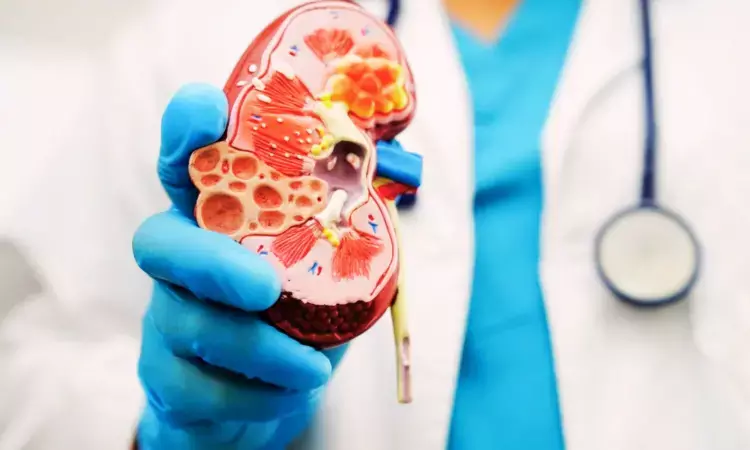- Home
- Medical news & Guidelines
- Anesthesiology
- Cardiology and CTVS
- Critical Care
- Dentistry
- Dermatology
- Diabetes and Endocrinology
- ENT
- Gastroenterology
- Medicine
- Nephrology
- Neurology
- Obstretics-Gynaecology
- Oncology
- Ophthalmology
- Orthopaedics
- Pediatrics-Neonatology
- Psychiatry
- Pulmonology
- Radiology
- Surgery
- Urology
- Laboratory Medicine
- Diet
- Nursing
- Paramedical
- Physiotherapy
- Health news
- Fact Check
- Bone Health Fact Check
- Brain Health Fact Check
- Cancer Related Fact Check
- Child Care Fact Check
- Dental and oral health fact check
- Diabetes and metabolic health fact check
- Diet and Nutrition Fact Check
- Eye and ENT Care Fact Check
- Fitness fact check
- Gut health fact check
- Heart health fact check
- Kidney health fact check
- Medical education fact check
- Men's health fact check
- Respiratory fact check
- Skin and hair care fact check
- Vaccine and Immunization fact check
- Women's health fact check
- AYUSH
- State News
- Andaman and Nicobar Islands
- Andhra Pradesh
- Arunachal Pradesh
- Assam
- Bihar
- Chandigarh
- Chattisgarh
- Dadra and Nagar Haveli
- Daman and Diu
- Delhi
- Goa
- Gujarat
- Haryana
- Himachal Pradesh
- Jammu & Kashmir
- Jharkhand
- Karnataka
- Kerala
- Ladakh
- Lakshadweep
- Madhya Pradesh
- Maharashtra
- Manipur
- Meghalaya
- Mizoram
- Nagaland
- Odisha
- Puducherry
- Punjab
- Rajasthan
- Sikkim
- Tamil Nadu
- Telangana
- Tripura
- Uttar Pradesh
- Uttrakhand
- West Bengal
- Medical Education
- Industry
Children born after fresh and frozen embryo transfers at increased leukemia risk than children conceived naturally: JAMA

France: In recent years, the use of medically assisted reproduction (MAR) techniques, such as in vitro fertilization (IVF) and intrauterine insemination (IUI), has become increasingly common among couples facing fertility challenges. However, there have been concerns about the potential long-term health effects on children conceived through these methods, particularly regarding the risk of cancer.
A new cohort study published in JAMA Network Open provides reassuring findings on this front, suggesting that offspring of MAR procedures are not at a significantly higher risk of developing cancer compared to those conceived naturally.
In the cohort study of 8 526 306 children, there was no difference in the overall risk of cancer among children born after fresh embryo transfer (ET), frozen embryo transfer (FET), or artificial insemination (AI) and children conceived naturally. However, an increased leukemia risk was observed among children born after fresh ET (especially those with the longest follow-up) and among children born after FET (particularly acute lymphoblastic leukemia).
"These findings suggest that leukemia risk among children conceived by frozen embryo transfer or fresh embryo transfer should be further monitored," the researchers wrote.
Cancer is the foremost cause of death among children worldwide. Treatments used for MAR are suspected risk factors because of their potential for epigenetic disturbance and associated congenital malformations. Paula Rios, French National Health Insurance, Saint-Denis, France, and colleagues aimed to assess the risk of cancer, overall and by cancer type, among children born after MAR compared with children conceived naturally.
For this purpose, the researchers searched the French National Mother-Child Register (EPI-MERES) for all live births in France between 2010 and 2021 (followed up until June 30, 2022). The EPI-MERES was built from comprehensive French National Health Data System data.
Using Cox proportional hazards regression models adjusted for maternal and child characteristics at birth, the risk of cancer was compared, overall and by cancer type, among children born after fresh ET, FET, or artificial insemination and children conceived naturally.
The study included 8 526 306 children with a mean age of 6.4 years; 51.2% were boys, 96.4% were singletons, 12.1% were small for gestational age at birth, and 3.1% had a congenital malformation.
The study revealed the following findings:
- There were 3.1% of children born after MAR, including 1.6% after fresh ET, 0.8% after FET, and 0.7% after AI.
- A total of 9256 case-patients with cancer were identified over a median follow-up of 6.7 years; 165, 57, and 70 were born after fresh ET, FET, and AI, respectively.
- The overall risk of cancer did not differ between children conceived naturally and those born after fresh ET (hazard ratio [HR], 1.12), FET (HR, 1.02), or AI (HR, 1.09).
- The risk of acute lymphoblastic leukemia was higher among children born after FET (20 case-patients; HR 1.61; risk difference [RD], 23.2 per million person-years) compared with children conceived naturally.
- Among children born between 2010 and 2015, leukemia risk was higher among children born after fresh ET (45 case-patients; HR, 1.42; adjusted RD, 19.7 per million person-years).
The study findings suggest that children born after FET or fresh ET had an increased leukemia risk compared with children conceived naturally. There is a need to monitor this risk, although resulting in a limited number of cases, given the continuous increase in the use of ART.
Reference:
Rios P, Herlemont P, Fauque P, et al. Medically Assisted Reproduction and Risk of Cancer Among Offspring. JAMA Netw Open. 2024;7(5):e249429. doi:10.1001/jamanetworkopen.2024.9429
Dr Kamal Kant Kohli-MBBS, DTCD- a chest specialist with more than 30 years of practice and a flair for writing clinical articles, Dr Kamal Kant Kohli joined Medical Dialogues as a Chief Editor of Medical News. Besides writing articles, as an editor, he proofreads and verifies all the medical content published on Medical Dialogues including those coming from journals, studies,medical conferences,guidelines etc. Email: drkohli@medicaldialogues.in. Contact no. 011-43720751


